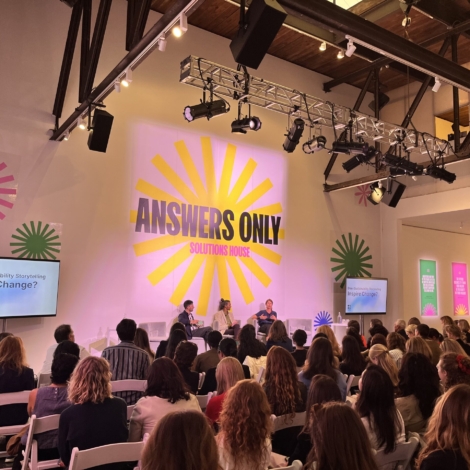A lot of us have suspected that stories can change people’s minds, and now we have some data to back up the assumptions. New research suggests that television and movies can change people’s minds about sustainability. Dr. Anirudh Tiwathia at the Rare Center for Behavior & the Environment in New York, NY (USA) shared his published and unpublished data at a presentation this week at Studio 525 as a part of Climate Week NYC. In randomized and controlled experiments with hundreds of participants, Dr. Tiwathia and his team found statistically significant evidence for the power of storytelling.
Three kinds of storytelling studied were each linked to changes in attitudes and plans as reported by the participants. One was a quick mention of eating plant-based foods, one was a reality cooking show that called on contestants to make a plant-based dish, and one was the movie Don’t Look Up, a climate change allegory. The takeaway is that each format nudged people toward more favorable opinions on sustainability in some way.
In the quick mention format participants watched different versions of a clip from the TV show Sex and the City. In each, Miranda Hobbes interrupts a conversation to order lunch at a county. In one version she orders steak, in another she orders steak then changes her order to “maybe I’ll try one of those plant-based things.” The participants answered survey questions after viewing the clips. Those who saw the mention of plant-based foods were more likely to say they would try eating those foods themselves.
The reality cooking show returned similar findings. Participants were randomized to watch an episode on turkey dishes or an episode on vegan dishes. Those who saw the vegan dish episode reported a higher likelihood of eating plant-based foods.
To study the effect of Don’t Look Up, the researchers randomized 1402 people to one of three groups: group one watched Don’t Look Up, group two watched Don’t Look Up plus a marketing video in which Leonardo DiCaprio discusses the movie’s relevance to climate change, and the third group watched one of five other non-climate-related movies that were out at the time. The apparent impact was largest among those who watched the movie and the marketing video. Compared to non-viewers, those who watched the movie were more likely to endorse “climate action mental states.” The term covers things like “Threat perception” (the belief that climate change is a threat), self-efficacy (believing you can take action and make a difference in climate change), worry, climate voter and others. For example the researchers found a difference in the likelihood to take action, which was 59.9 points on a 100-point scale among people who didn’t see the movie and 66.6 among those who did. The data are expressed in several ways and you can see the report at rare.org: Don’t Look Up Impact Study.
The findings could confirm ideas about behavior change that may already be entrenched among sustainable development practitioners. After Typhoon Haiyan hit the Philippines in 2013, Mercy Corps and a non-profit communications technology startup EngageSPARK decided to help victims save money and recover by telling them stories. The project created a soap opera in which characters made financial decisions, and it was sent in short episodes told through text messages and voice mail.
So, we think that stories work, and evidence is mounting that we might be right.

